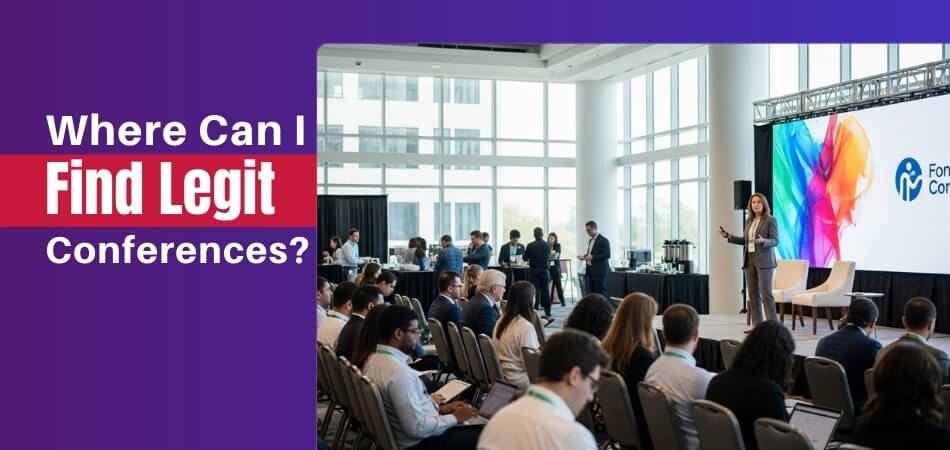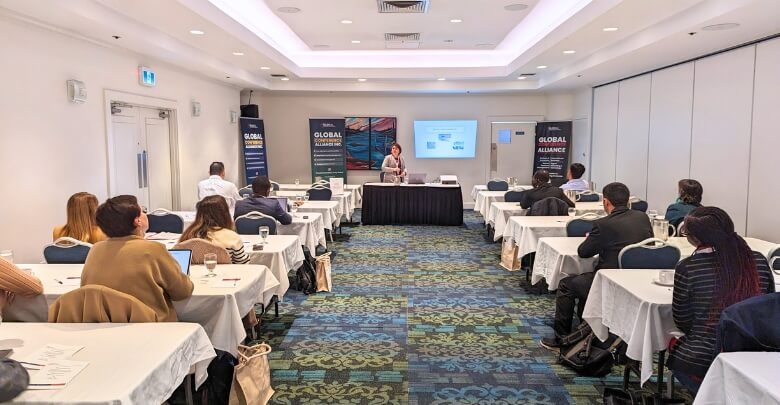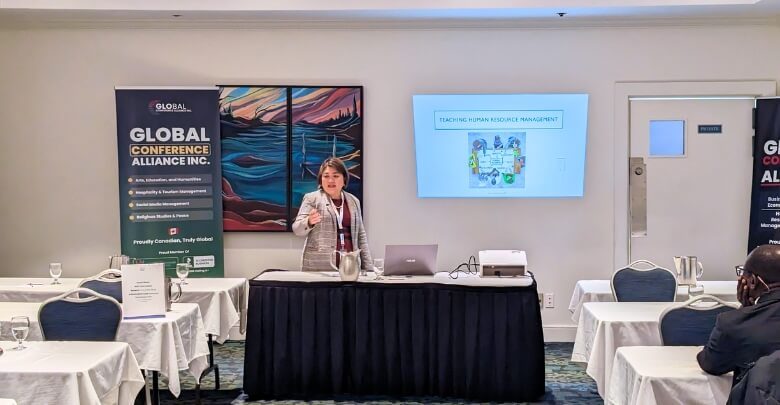Finding a legit conference can be a defining moment, but not every event out there is what it claims to be. Some may look fancy at first, but don’t offer much in return. So, if you’ve ever had the thought, “Where can I find legit conferences?”, you’re definitely not alone.
You can find legit conferences by checking official websites of known organizations, university event pages, professional associations, and trusted platforms like Global Conference Alliance Inc. or Eventbrite. Also, look at industry magazines, online directories, and social media groups. These sources usually provide clear event details, contact info, and even reviews.
Want to know more about finding the right conference without wasting your time or money? If you’re curious and want a clear answer, keep reading—this article covers everything you need to know.
Where Can I Find Legit Conferences?
Attending a conference can be exciting and helpful, but the hardest part is finding the right one. Many events look good from the outside but are not always worth your time or money. To avoid this, it helps to know where to look and what to check before deciding. Let’s go through some trusted places where you can find legit conferences.

Official Websites
Start by checking the official websites of well-known organizations and associations. Most industries have a leading body that hosts regular conferences and events. These sites often share complete details, including schedules, speakers, and registration links. This makes it easier to know the event is real and reliable.
University Events
Many universities host conferences that are open to professionals and the public. These events are usually well-organized and backed by research groups. You can look at the websites of big universities or their event calendars. Since they focus on learning and sharing knowledge, the chances of scams are low.
Professional Associations
Joining professional associations in your field can be a good way to learn about legitimate conferences. These groups often announce events for their members. Even if you are not a member, you can still find details on their websites. Conferences organized by these groups are often trusted and well-attended.
Trusted Platforms
Websites like Eventbrite, IEEE Xplore, or Global Conference Alliance Inc. often list conferences in different fields. These platforms are considered some of the top sites to find conferences because they give clear event details, including contact information and ticket options. Many organizers use them because they reach a wide audience. If the event is listed on a trusted platform, it is usually safe.
Industry Magazines
Industry magazines and newsletters often share updates about upcoming conferences. They focus on events that are respected and widely known. Reading these magazines gives you an easy way to know what’s happening in your field. You can also see reviews from past events.
Social Media Groups
LinkedIn and Facebook groups often post about conferences. These groups are usually made up of people working in the same field. You can also read comments or reviews from others who attended past events. This helps you see if the event is worth it.
Word of Mouth
Sometimes the best way to find a legit conference is to ask people you trust. Colleagues, mentors, or friends in the same field may have helpful recommendations. They can also warn you about events that are not worth your time. Personal advice often saves you from making mistakes.
Event Directories
There are online directories that only list conferences and seminars. These sites collect events from all over the world on different subjects. You can search by location, topic, or date to find one that fits you. Many of these directories also show reviews and ratings.
How to Use Social Media to Check Conference Credibility?
Social media is more than just a place for sharing photos and updates; it can also give you important clues about events. Many people now share their thoughts online after attending a conference. Reading these updates can help you see if an event is trustworthy or not. Let’s look at how you can use social media to check credibility.
Official Pages
Start by visiting the official pages of the conference on platforms like Facebook, LinkedIn, or X (Twitter). A real conference usually has an active page with posts, updates, and clear information. Check if the page looks professional, with proper branding and consistent details. Fake events often have little activity, copy-paste content, or poorly designed pages.
Speaker Profiles
Look up the listed speakers on LinkedIn or X (Twitter). Real speakers usually share updates about the events they plan to attend. If you see them confirm the event in their posts, it’s a positive sign. No mention at all or very vague mentions can be a red flag.
Attendee Reviews
Search for reviews or posts from people who attended in the past. Genuine reviews often describe what was shared, the quality of speakers, and their overall experience. Be careful with comments that look like bots or repeat the same lines. Reviews tied to real profiles with photos or work history are more reliable.
Hashtag Check
Most conferences use a hashtag for their event. Search that hashtag on X (Twitter), LinkedIn, or Instagram. A credible event usually has many posts from different people, including photos and comments. If the hashtag shows only a handful of posts or seems filled with fake accounts, it’s not a good sign.
Event Photos
Photos shared online can reveal a lot about an event. Check if people are posting real pictures from past conferences by the same organizers. Authentic photos often show real venues, speakers on stage, and attendees networking. If you only see stock images or no photos at all, be cautious.
Discussion Groups
Join LinkedIn or Facebook groups related to your field. Members there often share their thoughts about upcoming conferences and give useful tips. You can even ask directly if anyone has attended before. Honest feedback from active group members can save you from wasting money and time.
Media Coverage
Look for posts, mentions, or articles from news outlets or blogs on social media. Legitimate conferences often get at least some coverage, even if small. A quick search on Google News can also confirm if it has been mentioned by trusted sources. If you cannot find any coverage, consider it a warning.
Organizer Activity
Check the social media profiles of the event organizers. Active organizers usually post updates, respond to comments, and share details about speakers or sessions. Look into their past events to see if they were delivered as promised. A quiet or almost empty profile raises questions about credibility.
Signs of a High-quality Professional Conference
A professional conference should give real value and not just look good from the outside. Sometimes it can be hard to tell if an event is worth your time and money. Looking at certain signs can help you make the right choice. Let’s explore some clear indicators that show a conference is well-organized and trustworthy.
Clear Schedule
One reliable sign of a quality conference is a detailed schedule shared in advance. It usually includes session timings, speaker names, and topics. Getting this information early shows the organizers are prepared and helps you know what to expect.
Strong Networking
High-quality conferences provide many chances for networking. You might find coffee breaks, panel discussions, or dedicated networking sessions. These are useful because you can meet new people in your field. Events without networking opportunities often miss out on one of the most important benefits.
CPD Credits
Some professional conferences offer CPD (Continuing Professional Development) credits. These credits show that the event has been approved by a recognized body. Earning CPD credits makes the event more valuable for your career. If a conference offers this, it is usually a trusted one.
Known Sponsors
Sponsorship from well-known brands is a strong sign of credibility. Big companies usually check the quality before attaching their names to an event. When you see respected sponsors, it means the event has gained trust. Unknown or no sponsors may raise questions.
Proper Contact
Legit conferences always share proper contact information. This includes phone numbers, email addresses, and sometimes even a physical office address. Being able to reach organizers easily gives you confidence. Events that hide contact details are often not reliable.
Professional Speakers
Good conferences bring in speakers with real experience and expertise. You can often find their profiles on social media or official websites. If the list of speakers looks strong, the event is likely to deliver useful insights. Weak or unknown speakers may not add much value.
Venue Details
A professional event clearly mentions the venue and location details. Well-known venues are usually a positive sign. Some organizers even share photos or maps of the location. If the venue is missing or vague, it could be a warning sign.
Positive Reviews
Reviews from past attendees can tell you a lot. Look for honest feedback about the sessions, speakers, and overall management. Many people share their experiences online, which can help you decide. A long history of positive reviews is a very good indicator.
Steps You Can Take If You’ve Already Paid for a Fake Conference
Realizing you have paid for a fake conference can be frustrating and stressful. Many people fall into this trap because fake events often look convincing at first. While the loss feels upsetting, there are ways to deal with it. Let’s go through some practical steps you can take to handle the situation.
Contact Your Bank
The first step is to reach out to your bank or credit card provider. Explain the situation clearly and request a dispute with the charge. Many banks have fraud protection that might help you recover your money. Acting quickly increases your chances of getting it back.
Report to Authorities
File a report with your local consumer protection agency or cybercrime unit. Giving them details of the fake event can help prevent others from being scammed. Some authorities even guide you on further steps to take. Reporting shows you are serious about the fraud.
Inform Payment Platforms
If you paid through PayPal or similar services, report the transaction as fraudulent. These platforms often have buyer protection policies. They might block the scammer’s account and refund your payment. Do this as soon as possible for better results.
Collect All Proof
Save all emails, payment receipts, and event details connected to the fake conference. Screenshots of the website or social media posts are also helpful. Having proof makes it easier for banks or authorities to take your complaint seriously. Keep everything in one safe place.
Warn Others
Share your experience on social media or professional groups. By doing this, you can stop others from falling into the same trap. Be clear about the event name, organizers, and how they tricked you. Your warning might save someone else’s money and time.
Check Venue Directly
If a venue was mentioned in the event details, call them to confirm if the booking ever existed. Many times, scammers just use fake venue names or addresses. Confirming this adds strength to your complaint. It also helps authorities in their investigation.
Learn and Stay Alert
Even though it’s frustrating, use this experience as a lesson for the future. Always double-check contact details, speaker lists, and past event reviews before paying. Be cautious about offers that look too good to be true. Staying alert helps avoid repeating the mistake.
What to Do After Finding a Legit Conference?
Finding a legit conference can feel like a big win, but that’s only the first step. Once you know the event is real and trustworthy, it’s important to prepare well. This helps you get the best value from the experience. Let’s look at the steps you should take after confirming a conference is genuine.
Register Early
Registering early often saves you money and secures your spot. Many conferences offer early-bird discounts that can be helpful. It also gives you time to prepare for travel and stay. Delaying registration may lead to higher fees or even missing out.
Plan Travel
Once your registration is done, arrange your travel. Book flights, trains, or buses as early as possible to avoid high costs. If the event is far, plan for extra time to settle in before it begins. Being prepared reduces stress on the event day.
Book Accommodation
Look for hotels or guest houses close to the venue. Staying nearby saves time and makes attending easier. Some conferences even suggest partner hotels with discounts. Booking early gives you more options at better prices.
Review Schedule
Go through the event schedule carefully before attending. Highlight the sessions or workshops that match your interests. Planning this ahead of time helps you use your time wisely. Without a plan, you may end up missing valuable sessions.
Research Speakers
Check the background of the listed speakers. Learn about their work, topics, and expertise. This makes it easier to follow their sessions and even prepare questions. Knowing who they are adds more value to the event.
Prepare Materials
Bring along notebooks, pens, or digital devices for notes. Keep your business cards or contact info ready for networking. Some people even prepare a short introduction about themselves. If you are preparing for a virtual conference, check your internet connection, camera, and microphone to make sure everything runs smoothly.
Stay Engaged
During the event, take part in discussions, workshops, and networking sessions. Ask questions when possible and interact with other attendees. Active participation makes the experience more rewarding. Staying engaged ensures you gain more than just listening to speakers.
Frequently Asked Questions
When you’re planning to attend a professional conference, it’s normal to have a lot of questions. You want to make sure the event is worth your time, money, and energy. Below are some common questions and answers that can help you feel more confident about your decision.
Are Free Conferences Always Safe?
Not always. While some free conferences are legit and offer good value, others might be used to collect personal data or promote products. Always check the organizers ‘ website and speaker list before signing up for any free event.
What Is the Best Time to Search for Conferences?
The best time to search for conferences is at the start or end of a calendar year. Many organizations release their event calendar early, and checking reliable conference listing sites during this time gives you more room to prepare, register, and plan your travel or attendance.
Can I Trust Conferences Found in Email Promotions?
Only if the email comes from a known source or someone you trust. Scammers often send fake event invites through email. Check the sender’s email address, the website links, and search the event online before clicking on anything. To be extra sure, compare the event details with listings on trusted international conference websites, as real events are usually featured there too.
How Do I Find Conferences Related to My Field?
Use industry websites, online directories, or keyword searches with your topic of interest. Searching with specific terms like “marketing conferences 2025” or “tech events near me” can give better and more targeted results.
Should I Trust Conferences That Ask for Full Payment Upfront?
It depends. Many legit events do ask for full payment during registration, but it should always be through a secure platform. If you can’t find refund policies or contact details, that could be a warning sign to stay away.
How Do I Avoid Getting Trapped by Fake Conferences?
The best way to avoid fake conferences is to research the organizers, check for reviews, and confirm venue details directly with the location. Some watchdog groups and forums even publish fake conferences list PDF format, where common scams are reported, which can be helpful for double-checking before you register.
Is It Safe to Book Conferences Through Third-party Websites?
Only book through trusted third-party platforms that have reviews and secure payment options. Avoid unknown sites that look poorly made or offer very low prices. Always double-check if the conference is listed on the official organizer’s page too.
How Can I Track Conference Deadlines Easily?
Use tools like online calendars, reminders, or event tracking apps. You can also sign up for newsletters from trusted conference listing websites so you never miss important deadlines like abstract submissions or early-bird rates.
What Does a Well-Made Conference Website Look Like?
It usually has a clear schedule, a list of speakers, a registration section, FAQs, and contact info. A good site also loads fast, looks professional, and uses secure payment gateways. If a site looks shady, it’s safer to stay away.
Concluding Words
A legit conference is more than just an event — it’s a chance to learn, connect, and grow. But the challenge often lies in spotting the ones that are truly worth your time and money.
When someone asks themselves where can I find legit conferences, the answer is usually found in trusted sources like official websites, universities, professional associations, and well-known platforms. These places offer details that help you separate real events from fake ones.
If you’re ready to attend, take a little time to check schedules, speakers, and reviews before making any payment. With the right approach, you can confidently choose events that bring real value and memorable experiences.







